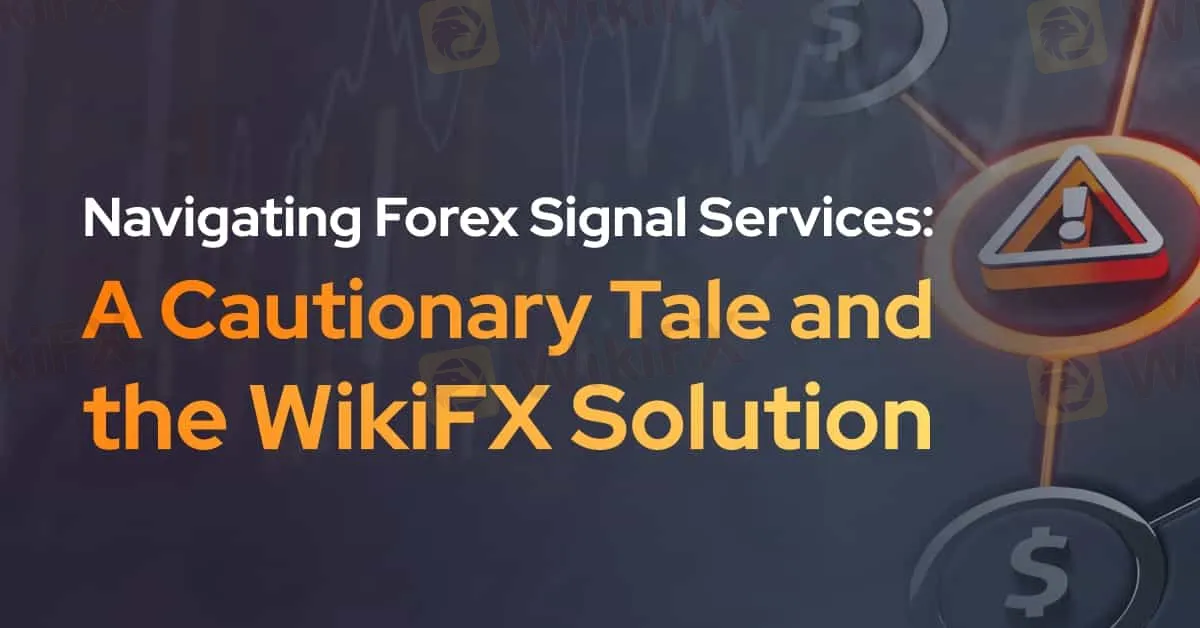简体中文
繁體中文
English
Pусский
日本語
ภาษาไทย
Tiếng Việt
Bahasa Indonesia
Español
हिन्दी
Filippiiniläinen
Français
Deutsch
Português
Türkçe
한국어
العربية
Navigating Forex Signal Services: A Cautionary Tale and the WikiFX Solution
Abstract:In the vast and intricate landscape of Forex trading, signal services have emerged as a popular tool for traders seeking assistance in decision-making. However, the proliferation of these services has also given rise to potential pitfalls, with some providers making unrealistic promises and employing deceptive practices. In this article, we'll delve into the risks associated with Forex signal services, shed light on common scams, and introduce WikiFX as a valuable resource for traders looking to make informed choices in the world of signals.

Introduction
In the vast and intricate landscape of Forex trading, signal services have emerged as a popular tool for traders seeking assistance in decision-making. However, the proliferation of these services has also given rise to potential pitfalls, with some providers making unrealistic promises and employing deceptive practices. In this article, we'll delve into the risks associated with Forex signal services, shed light on common scams, and introduce WikiFX as a valuable resource for traders looking to make informed choices in the world of signals.
The Promise and Peril of Forex Signal Services
Forex signal services offer traders the allure of expert guidance, providing buy or sell signals that claim to enhance trading success. While some services are legitimate and can be beneficial, the market is rife with providers making exaggerated claims about their accuracy and profitability. Traders must exercise caution to avoid falling prey to scams that can result in financial losses.
Unrealistic Promises and Manipulated Results
One of the primary dangers associated with Forex signal services is the prevalence of providers making unrealistic promises. Some claim to offer a high percentage of profitable signals, creating the illusion of a surefire way to success. In reality, many of these claims are unsubstantiated, and traders may find themselves disappointed by the actual performance of these signals.
Scammers often resort to manipulating historical results and using fake testimonials to attract unsuspecting traders. It is essential for traders to scrutinize the track record and performance claims of signal services before committing their funds.
WikiFX: Your Shield Against Signal Service Scams
Amidst the challenges posed by unreliable signal services, WikiFX emerges as a trusted ally for traders seeking transparency and credibility. WikiFX provides a platform where traders can access detailed information about various signal service providers, enabling them to make informed decisions and avoid potential scams.
Understanding the WikiFX Advantage
WikiFX's platform is designed to empower traders with comprehensive information about signal service providers. Users can find detailed profiles of signal services, including their historical performance, accuracy rates, and user reviews. This transparency allows traders to evaluate the credibility of a signal service before subscribing, reducing the risk of falling victim to deceptive practices.
How to Utilize WikiFX
Accessing WikiFX is a straightforward process. Traders can visit the official website at www.wikifx.com, where they will find an intuitive interface that facilitates easy navigation. By using the search function or browsing through the available information, traders can access a wealth of knowledge about signal services and make informed choices based on real data.
Conclusion
While Forex signal services can be a valuable resource for traders, it is crucial to approach them with caution due to the prevalence of scams and deceptive practices in the market. WikiFX serves as a reliable solution, offering transparency and detailed information about signal service providers. By leveraging the resources provided by WikiFX, traders can make educated decisions, avoid falling victim to scams, and enhance their overall trading experience. In the complex world of Forex, having a trustworthy ally like WikiFX can make all the difference in navigating the challenges and pitfalls associated with signal services.

Disclaimer:
The views in this article only represent the author's personal views, and do not constitute investment advice on this platform. This platform does not guarantee the accuracy, completeness and timeliness of the information in the article, and will not be liable for any loss caused by the use of or reliance on the information in the article.
Read more

WikiFX Review: Is IVY Markets Reliable?
IVY Markets, established in 2018, positions itself as a global brokerage offering a diverse range of trading instruments, including Forex, Commodities, Cryptocurrencies, and Stocks. The platform provides two primary account types—Standard and PRO—with a minimum deposit requirement of $50 and leverage up to 1:400.

Germany's Election: Immigration, Economy & Political Tensions Take Centre Stage
Germany is set to hold a crucial general election on 23 February 2025, with voter frustration over migration emerging as a dominant issue.

XTB Secures Chilean License, Expands Latin America Footprint
XTB gains a securities agent license in Chile, boosting its Latin America presence. The broker plans to offer stocks, ETFs, and derivatives to local investors.

Deepfake Deception: New Face of Financial Scams in Forex and Crypto
In the ever-evolving landscape of financial scams, fraudsters are now leveraging cutting-edge artificial intelligence (AI) to deceive unsuspecting victims. Deepfake technology, which manipulates audio and video to create hyper-realistic but entirely fabricated content, has become a powerful tool for scammers, particularly in the forex and cryptocurrency markets.
WikiFX Broker
Latest News
Why Do You Keep Blowing Accounts or Making Losses?
eToro Adds ADX Stocks to Platform for Global Investors
B2BROKER Launches PrimeXM XCore Support for Brokers
Germany's Election: Immigration, Economy & Political Tensions Take Centre Stage
WikiFX Review: Is IVY Markets Reliable?
Checkout FCA Warning List of 21 FEB 2025
Google Bitcoin Integration: A Game-Changer or Risky Move?
IG 2025 Most Comprehensive Review
Why Should Women Join FX Market?
ED Exposed US Warned Crypto Scam ”Bit Connect”
Currency Calculator






